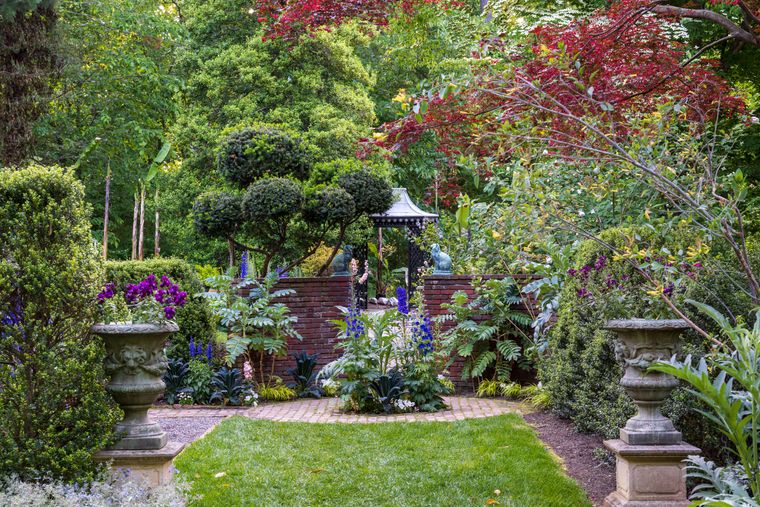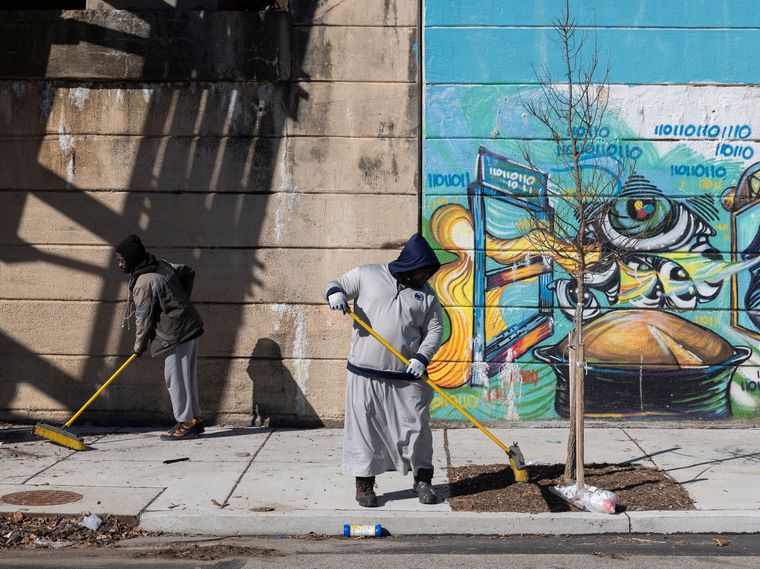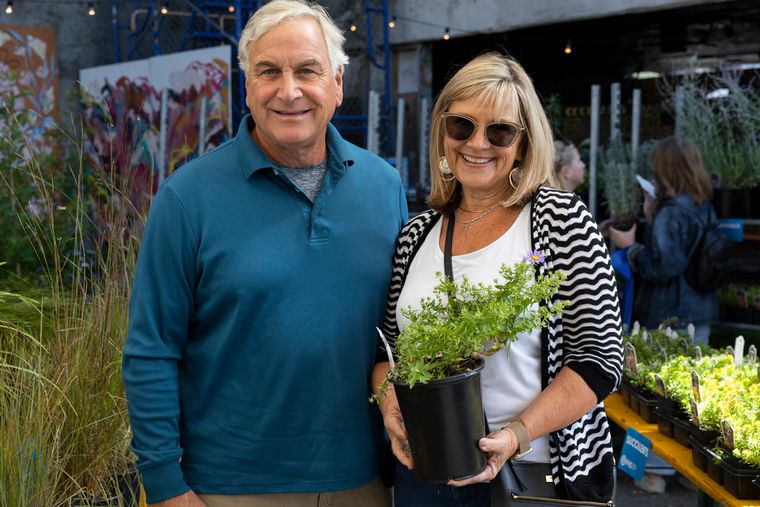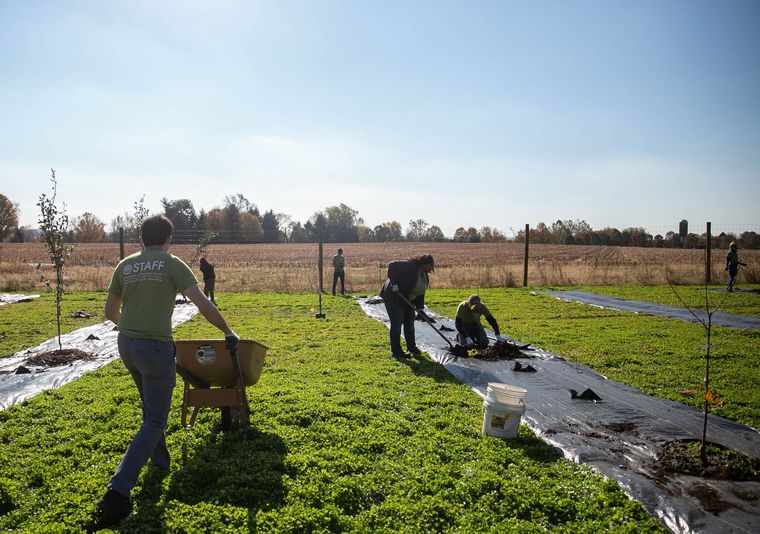



The Urban Agriculture Resilience Program Awards Funds to Pennsylvania Horticultural Society’s Strawberry Mansion Green Resource Center in North Philadelphia
phs now

21 U.S. Urban Agriculture Public Garden-Community Partner Collaborations Awarded Funds
Monday, June 28, 2021 - The United States Botanic Garden (USBG) and American Public Gardens Association (Association) have partnered to support public gardens and their community partners engaging in urban agriculture and food-growing to address food security challenges exacerbated by the COVID-19 pandemic. Last week, the USBG and the Association awarded $403,450 to 21 public garden partnerships across the United States that will foster public engagement and education in urban food growing and build capacity in urban agriculture programs. The Urban Agriculture Resilience Program aims to strengthen collaborations, promote resilience, and gather best practices from across the U.S.
Pennsylvania Horticultural Society’s (PHS) Strawberry Mansion Green Resource Center is one of the recipient gardens to be awarded funds. The Strawberry Mansion Green Resource Center is a community-based urban agriculture and food gardening site developed through a partnership between PHS, East Park Revitalization Alliance (EPRA), Neighborhood Gardens Trust (NGT), and community members. Located at 3212-34 Ridge Ave. in North Philadelphia and within one of the city’s disadvantaged neighborhoods, the Center was started as a community garden more than ten years ago on vacant, neglected land. It has since grown and expanded its footprint over the years in response to community need and support from partners and stakeholders. Currently the location serves as a fully functioning green house, urban agriculture education space, and community growing space where over 40 families grow produce for themselves and the community.
Support from the Urban Agriculture Resilience Program will allow partners to continue to engage the community, deliver educational workshops, and develop the site further through targeted infrastructure improvements that will allow for increased youth involvement and enhanced agricultural production.
These funds from The Urban Agriculture Resilience Program will help participating programs in 16 states and Washington, D.C. integrate urban food growing and education while addressing food security challenges facing their communities. The program seeks to leverage the strength of public gardens working with partners in their communities, ranging from schools, universities, and urban farms to food pantries, community gardens, local government agencies, and nonprofit organizations. The Urban Agriculture Resilience Program will provide insight into successful approaches and future opportunities for public gardens and their partners to creatively utilize their unique assets to advance food and agriculture education in urban communities.
“The past year has underscored the widespread interest in, and need for, urban agriculture programs that address food insecurity. We are excited to build on the success of last year’s Urban Agriculture Resilience Program and support innovative collaborations between public gardens and diverse partners in their communities,” said Saharah Moon Chapotin, executive director of the U.S. Botanic Garden. “It’s inspiring to see these partners coming together to extend the reach and deepen the impact of their programming.”
“We are proud to continue to partner with the U.S. Botanic Garden and offer these awards that provide opportunities to directly address knowledge gaps and food insecurity in 21 communities nationwide,” said Casey Sclar, executive director of the American Public Gardens Association. “Through these awards we also will continue to gain knowledge of what makes successful partnerships possible, helping more gardens to be the resilient centers of their communities.”
The Urban Agriculture Resilience Program began in 2020 as a way for the USBG and the Association to help public gardens continue urban agriculture and food growing programs facing funding and capacity challenges due to COVID-19.
Public garden and community partner collaborations awarded 2021 funding include:
Alabama
- Friends of Birmingham Botanical Gardens, in collaboration with Birmingham Botanical Gardens, Alabama Cooperative Extension System, Community Kitchens
Arizona
- Desert Botanical Garden, in collaboration with Unlimited Potential, TigerMountain Foundation, The Orchard Community Learning Center, and Roosevelt School District
Colorado
- The Gardens on Spring Creek, in collaboration with Food Bank for Larimer County
Delaware
- Delaware Center for Horticulture, in collaboration with Pennsylvania Horticultural Society
District of Columbia
- Friends of the National Arboretum, in collaboration with the U.S. National Arboretum
Georgia
- Atlanta Botanical Garden, in collaboration with Friends of Refugees and Global Growers Network
- Trees Atlanta, in collaboration with the City of Atlanta Mayor's Office of Resilience and the City of Atlanta Department of Parks and Recreation
Illinois
- The Morton Arboretum, in collaboration with Homan Grown, Stone Temple Baptist Church, and Permaculture Chicago Teaching Institute
Michigan
- University of Michigan Matthaei Botanical Gardens and Nichols Arboretum, in collaboration with Oakland Avenue Urban Farm, Detroit Black Community Food Security Network D-Town Farm
Minnesota
- Minnesota Landscape Arboretum, in collaboration with Pillsbury United Communities, WE WIN Institute, St. Paul City Schools, Plymouth Christian Youth Center, Kaleidoscope Place, North Point Health & Wellness Center Community Food Shelf, and CAP Agency Food Shelf
Missouri
- EarthDance, in collaboration with The Vine at St. Stephen’s Episcopal Church, Restorative Justice Movement, and BTC St. Vincent’s Food Pantry
New York
- Mary Mitchell Family and Youth Center, in collaboration with The New York Botanical Garden, Morris Campus Farm, La Finca del Sur, and Morning Glory Community Garden
- Queens Botanical Garden, in collaboration with La Jornada Food Pantry at Queens Museum
North Carolina
- Ability Garden, in collaboration with New Hanover County Arboretum and Cooperative Extension, Wilmington Housing Authority
Ohio
- Holden Forests & Gardens, in collaboration with Revolutionary Love Garden, Have a Hive, and Lettuce Tree Farms
Pennsylvania
- Grumblethorpe Historic House & Gardens (PhilaLandmarks), in collaboration with Chef Gail Hinson, Johnson House Historic Site, and Historic Fair Hill
- Pennsylvania Horticultural Society, in collaboration with East Park Revitalization Alliance, Neighborhood Gardens Trust
- Phipps Conservatory and Botanical Gardens, in collaboration with Homewood-Brushton YMCA
Tennessee
- Knoxville Botanical Garden and Arboretum, in collaboration with The Museum of Infinite Outcomes
Washington
- University of Washington Botanic Gardens, in collaboration with Intellectual House, UW Nutritional Sciences Program, UW Neighborhood Design/Build Studio, and UW Program on the Environment
Wyoming
- Friends of the Cheyenne Botanic Gardens, in collaboration with Wyoming Hunger Initiative
###
Online media folder of urban agriculture images from some recipient programs
Media contacts:
Devin Dotson, U.S. Botanic Garden, (202) 306-6743;
Richard Doran, American Public Gardens Association, (610) 708-3013;
Sin Gogolak, Pennsylvania Horticultural Society (215) 988-1631
About the United States Botanic Garden
The United States Botanic Garden (USBG) is the oldest continuously operating public garden in the United States. The Garden informs visitors about the importance and fundamental value and diversity of plants, as well as their aesthetic, cultural, economic, therapeutic, and ecological significance. With over a million visitors annually, the USBG strives to demonstrate and promote sustainable practices. The U.S. Botanic Garden is a living plant museum accredited by the American Alliance of Museums and Botanic Gardens Conservation International. www.USBG.gov
About the American Public Gardens Association
The American Public Gardens Association is the leading professional organization for the field of public horticulture. We advance the field by encouraging best practices, offering educational and networking opportunities, and advocating on behalf of our members, our programs and public gardens worldwide. We work together with our members and others to strengthen and shape public horticulture, providing the tools and support industry professionals need to better serve the public while preserving and celebrating plants creatively and sustainably.
Since 1940, we have been committed to increasing cooperation and awareness among gardens. Our members include more than 600 institutions, spanning 49 states, the District of Columbia, Canada, and 20 countries. Our members include, but are not limited to, botanic gardens, arboreta, zoos, museums, colleges and universities, display gardens, and research facilities.
About the Pennsylvania Horticultural Society
The Pennsylvania Horticultural Society (PHS), an internationally recognized nonprofit organization founded in 1827, plays an essential role in the vitality of the Philadelphia region by creating healthier living environments, increasing access to fresh food, growing economic opportunity, and building deeper social connections between people. PHS delivers this impact through comprehensive greening and engagement initiatives in more than 250 neighborhoods; an expansive network of public gardens and landscapes; year-round learning experiences; and the nation’s signature gardening event, the Philadelphia Flower Show. PHS provides everyone with opportunities to garden for the greater good as a participant, member, donor, or volunteer. For information and to support this work, please visit PHSonline.org.
###